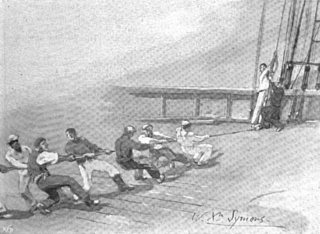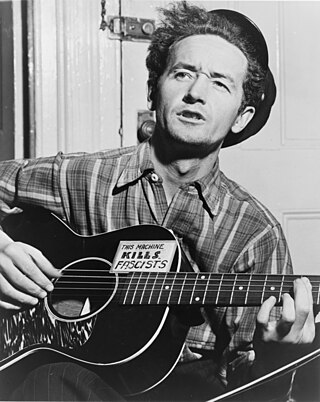This is a list of performers who focus on maritime music or who have at some point made notable contributions to that genre.
This is a list of performers who focus on maritime music or who have at some point made notable contributions to that genre.
A roots revival is a trend which includes young performers popularizing the traditional musical styles of their ancestors. Often, roots revivals include an addition of newly composed songs with socially and politically aware lyrics, as well as a general modernization of the folk sound.

A sea shanty, shanty, chantey, or chanty is a genre of traditional folk song that was once commonly sung as a work song to accompany rhythmical labor aboard large merchant sailing vessels. The term shanty most accurately refers to a specific style of work song belonging to this historical repertoire. However, in recent, popular usage, the scope of its definition is sometimes expanded to admit a wider range of repertoire and characteristics, or to refer to a "maritime work song" in general.

David Coffin is an American traditional folk musician specializing in early music and maritime music, based in Gloucester, Massachusetts, United States. He is the song leader for the Revels music programs in Cambridge, Massachusetts. He also presents music enrichment programs for schools throughout New England. One program is based on the history of the recorder, and the other is called Life at Sea: A Voyage in Song.
"Barrett's Privateers" is a modern folk song in the style of a sea shanty, written and performed by Canadian musician Stan Rogers, having been inspired after a song session with the Friends of Fiddler's Green at the Northern Lights Festival Boréal in Sudbury, Ontario. The song describes a 1778 summer privateering journey to the Caribbean on a decrepit sloop, the Antelope, captained by Elcid Barrett; when it engages in a failed raid on a larger American ship, the Antelope sinks and all the crew is killed except the singer, who returns six years later "a broken man", having lost both his legs in the disaster. Although Barrett, the Antelope and other specific instances mentioned in the song are fictional, "Barrett's Privateers" is full of many authentic details of privateering in the late 18th century.
"Northwest Passage" is one of the best-known songs by Canadian musician Stan Rogers. An a cappella song, it features Rogers alone singing the verses, with Garnet Rogers, David Alan Eadie and Chris Crilly harmonizing with him in the chorus.
Thomas John Lewis is a British singer and writer of nautical songs and sea shanties, some of whose works have become "folk standards." He's been recorded by over 40 other artists including Nathan Evans and has been called one of the finest exponents of contemporary nautical songs.
"Drunken Sailor", also known as "What Shall We Do with a/the Drunken Sailor?" or "Up She Rises", is a traditional English sea shanty, listed as No. 322 in the Roud Folk Song Index. It was sung aboard English sailing ships at least as early as the 1830s.

Stanley James Hugill was a British folk music performer, artist and sea music historian, known as the "Last Working Shantyman" and described as the "20th century guardian of the tradition".
"Santianna", also known as "Santiana", "Santy Anna", "Santayana", "Santiano", "Santy Anno" and other variations, is a sea shanty referring to the Mexican General Antonio López de Santa Anna. The song is listed as number 207 in the Roud Folk Song Index.
"South Australia" is a sea shanty, also known under such titles as "Rolling King" and "Bound for South Australia". As an original worksong it was sung in a variety of trades, including being used by the wool and later the wheat traders who worked the clipper ships between Australian ports and London. In adapted form, it is now a very popular song among folk music performers that is recorded by many artists and is present in many of today's song books.

The American folk music revival began during the 1940s and peaked in popularity in the mid-1960s. Its roots went earlier, and performers like Josh White, Burl Ives, Woody Guthrie, Lead Belly, Big Bill Broonzy, Richard Dyer-Bennet, Oscar Brand, Jean Ritchie, John Jacob Niles, Susan Reed, Paul Robeson, Bessie Smith, Ma Rainey and Cisco Houston had enjoyed a limited general popularity in the 1930s and 1940s. The revival brought forward styles of American folk music that had in earlier times contributed to the development of country and western, blues, jazz, and rock and roll music.

The Fisherman's Friends are a folk music group from Port Isaac, Cornwall, who sing sea shanties. They have been performing locally since 1995, and signed a record deal with Universal Music in March 2010. Whilst essentially an a cappella group, their studio recordings and live performances now often include traditional simple instrumentation.

Bounding Main is an a cappella quintet focusing on traditional sea shanties and maritime music. They are located in the United States.

Contemporary folk music refers to a wide variety of genres that emerged in the mid-20th century and afterwards which were associated with traditional folk music. Starting in the mid-20th century, a new form of popular folk music evolved from traditional folk music. This process and period is called the (second) folk revival and reached a zenith in the 1960s. The most common name for this new form of music is also "folk music", but is often called "contemporary folk music" or "folk revival music" to make the distinction. The transition was somewhat centered in the United States and is also called the American folk music revival. Fusion genres such as folk rock and others also evolved within this phenomenon. While contemporary folk music is a genre generally distinct from traditional folk music, it often shares the same English name, performers and venues as traditional folk music; even individual songs may be a blend of the two.

Jerry Bryant is an American folksinger specializing in maritime music. In addition to performing traditional songs, he also has written songs in a traditional style. Of his original songs, The Ballad of Harbo and Samuelsen is among his best known and has been recorded by several other performers including William Pint and Felicia Dale, Forebitter, and Rick Lee.

Salty Walt & the Rattlin' Ratlines is a sea shanty performing group based in San Francisco, originally formed in 2003. The group consists of Walter "Salty Walt" Askew, Daniel Briggs, Griff Nelson, and Jon Richardson. On occasion, they also perform Celtic music and since at least 2005 have been performing a show of traditional carols and wassails on Boxing Day. They were voted San Francisco's "Best Sea Shanty Band" in 2006. The group appeared at the "Festival Maritim" in Vegesack, Germany in 2007.
The Johnson Girls are an all-woman a-cappella song group based in New York City. They specialize in maritime music and perform songs from a melange of cultures including the United States, Britain, Ireland, Italy French-Canada, and the Caribbean. Named after a traditional African-American sea shanty, "The Johnson Girls," they formed as a quintet in 1997. The original members were Joy Bennett, Maggie Bye, Alison Kelley, Bonnie Milner, and Deirdre Murtha. Bye left the group after following the release of The Johnson Girls' second CD. Each of The Johnson Girls is also a member of the official maritime group of South Street Seaport Museum, The New York Packet.

Banana Boat is a Polish a cappella sextet, authoring and performing original songs representing the genre of neo-shanties. Being one of the pioneers of the new genre, the group retains its simultaneous focus on contemporary interpretations of traditional sea shanties and maritime music. Owing to its characteristic six-part, jazzy harmony, departing from the traditional sound of the music of the sea, the group has become one of the emblems of what the international artists of the maritime stage have informally come to dub as the Polish style maritime song. With maritime music constantly in the focus of its activity, since 2004, Banana Boat has also been experimenting with other musical genres, including popular and jazz compositions, inviting other artists to participate in individual projects. The group is a Member of International Seasong and Shanty Association (ISSA).

The Vancouver Folk Song Society is a nonprofit organization that promotes folk music in the Vancouver, British Columbia, area. The society was founded in 1959 as the Folk Song Circle. The VFSS is not primarily a venue for concerts by professional performers, but a place where everyone is encouraged to participate in music.